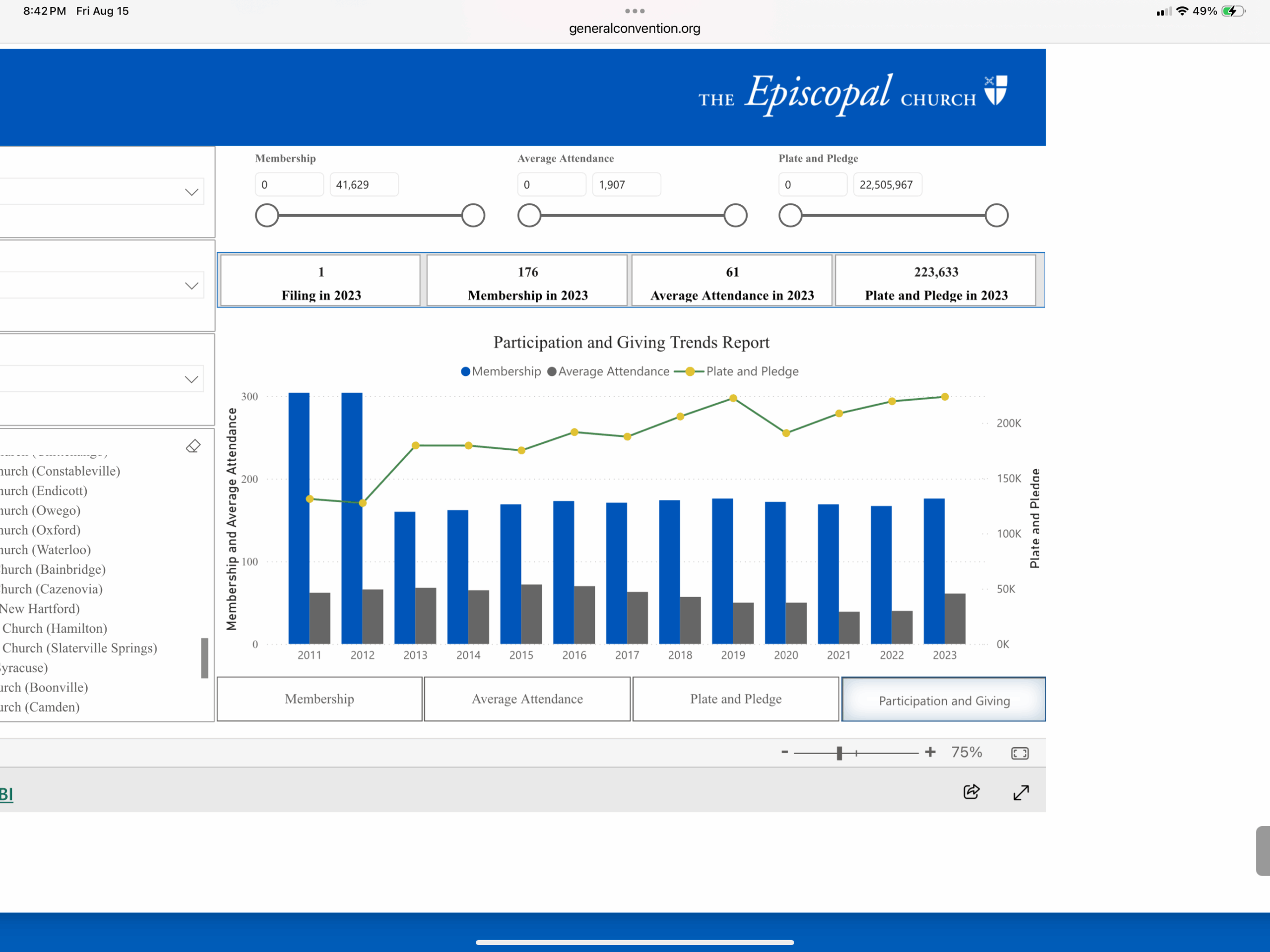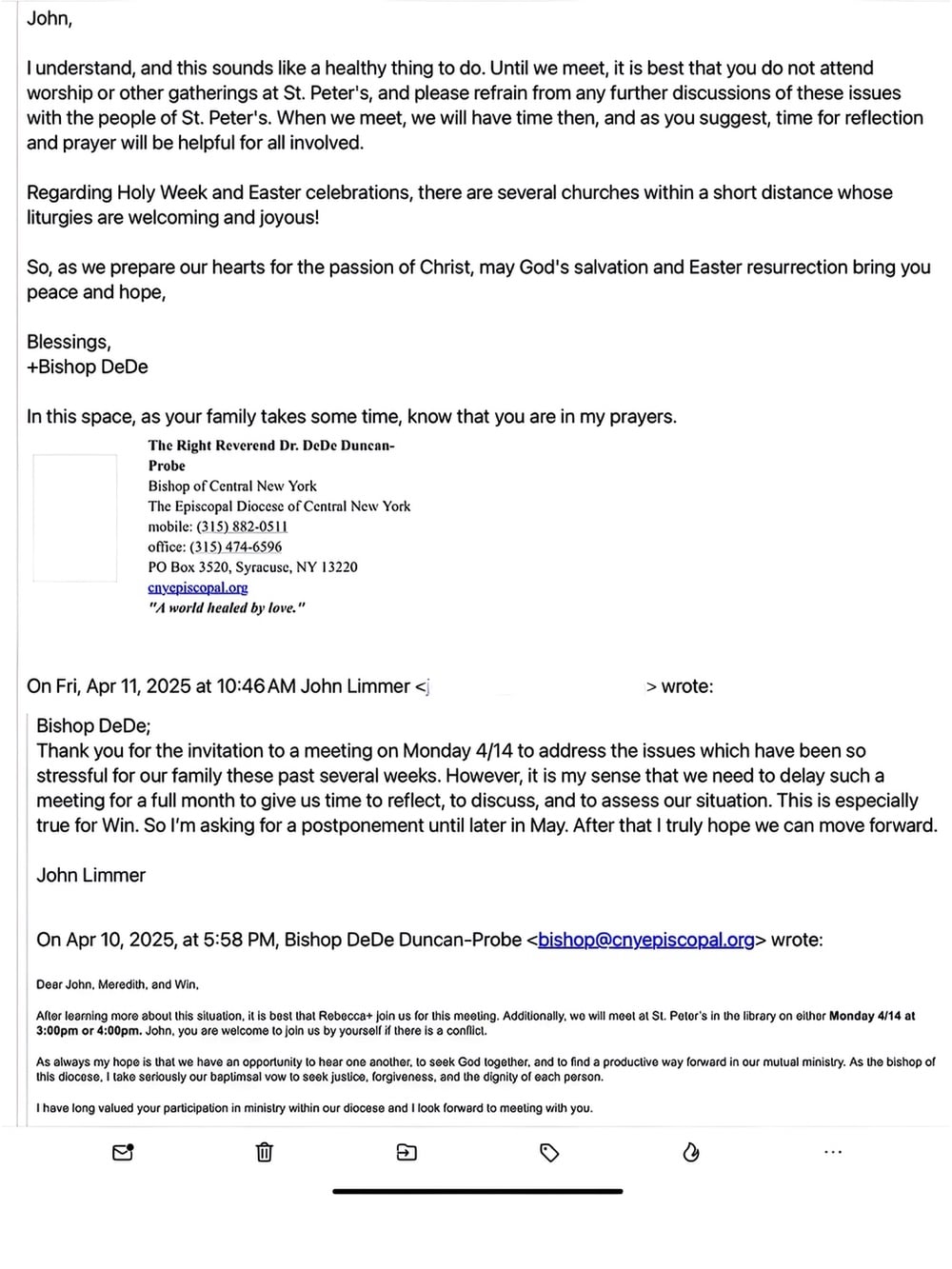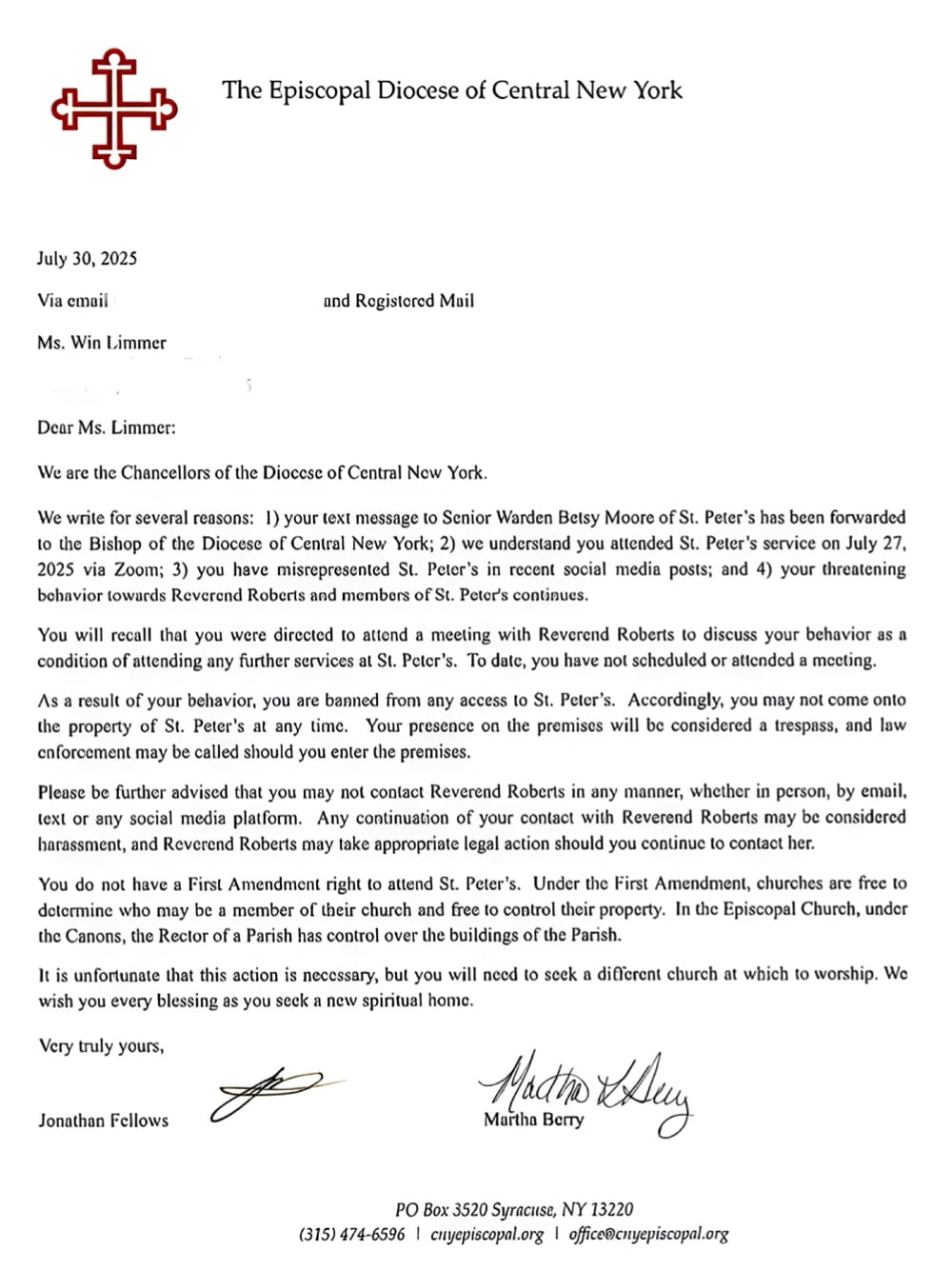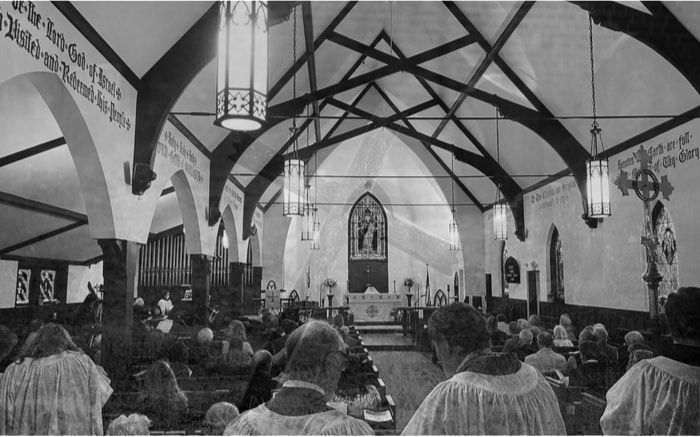You’d think that, by now, parishes in The Episcopal Church would be tired of pulling the whole “So-and-so is a terrorist, so we’re barring them from the church” routine. Yet, even with the storm brewing in the Episcopal Diocese of New York and the profound damage to parishes that comes from engaging in this behavior, the games continue, including at St. Peter’s Cazenovia, which is located in the Diocese of Central New York. Specifically, the church, its rector, Rebecca Roberts, and the Diocese recently collaborated to bar parishioner Win Limmer from the church based on what we believe are false claims that Win has threatened and harassed members of the church.
A little about St. Peter’s
St. Peter’s is, for the Episcopal Church, a mid-sized church, with an average 2023 Sunday attendance of 61, and an annual pledge and plate of $223,633.

That said, like many parishes, it’s an aging congregation that occupies a costly, energy-inefficient building. In other words, it can’t afford to lose members or money.
The rector, the Rev. Rebecca Roberts, is a General Theological Seminary alumna; this is her first calling as a rector.

And, as has been our experience with churches in the Episcopal Church that shun and ostracize those who rock the boat or are otherwise inconvenient, the parish loudly trumpets that it’s inclusive and welcoming — and if you’re LGBTQ+, you can even get married at St. Peter’s.
Uh-huh.

Meet Win Limmer
We spoke with Win by phone, and she’s delightful and intelligent.
Recently separated from her wife, Win understandably is feeling blue. As a result, she spoke a number of times with Roberts about her situation.
Thus, Win is in a vulnerable place. In other words, any clergyperson with integrity knows to tread lightly and do nothing that could add to her distress. We therefore are doubly concerned about Roberts’ alleged actions, including her lack of concern for those entrusted to her pastoral care,
So why the tension?
That begs the question: Why the tension?
In our conversations with Win and others, we picked up on a clear pattern. Specifically, it appears that Roberts feels threatened by Win.
For example, in one situation, Win briefly covered for Roberts to lead a book discussion group at the church. As a former teacher, Win brought her passion and enthusiasm to the class, trying to make the subject engaging and enjoyable.
Yet Roberts later confronted Win, saying that multiple people had complained to her that Win was “too intense.”
That’s problematic for multiple reasons:
- It’s not clear how Win was “too intense.” Was she shouting? Using a megaphone? Grabbing people by the shoulders and shaking them? We doubt it.
- It is a mistake to think that we can change people. Thus, putting to one side the whole issue of “intensity,” people are who they are, and the Baptismal Covenant requires that we welcome all people. Not just those who dress like us, act like us, vote like us, behave like us, or lead book discussions like us.
- It’s not fair to try to change people. Unless Win sought out feedback, Roberts needs to keep her mouth shut and enjoy the fact that she’s got a committed volunteer willing to show up and be part of the parish.
Indeed, while we’ve never met Roberts, our take on it is that she’s the classic covert narcissist, replete with superficial charm, an ability to manipulate others, deep insecurity, and a willingness to lie and manipulate in order to get her way, especially when she feels threatened.
Efforts at resolution
Earlier this year, Bishop De-De Duncan Probe got involved and suggested a meeting to resolve issues. Without asking if the date worked, she suggested a meeting at St. Peter’s involving herself, Win, Win’s parents, and Roberts. Duncan Probe also suggested that Win and her family not attend St. Peter’s or discuss issues there with parishioners prior to the meeting. There was no discussion about watching livestreams of church services.
Traumatized by ongoing issues with Roberts and her behavior, Win’s father wisely suggested they needed to postpone so that they could get some breathing space and think through things.
Duncan Probe agreed that this made sense, and things remained quiet until July, when Win attended a livestream of services at St. Peter’s.
Pretty innocuous, right?

Apparently, the church and Roberts didn’t think so, because soon after, the diocesan chancellors sent Win a letter barring her from the church. No discussion, no hearing, no due process — and with full knowledge that efforts were afoot to negotiate a positive outcome.

There are several additional issues with the letter from the chancellors:
- Most significantly, the letter claims that Win was “directed” to attend a meeting. The arrogance of that language is appalling and inconsistent with Episcopal polity. To be clear, Episcopal bishops have zero authority over laity, so Duncan-Probe cannot “direct” a member to do anything. And in a day and age when church membership and attendance are no longer normative, it’s incredibly stupid and obnoxious to try to “direct” any church member to do anything.
- As previously stated, attending a livestream service would not seem to be an issue. Nothing in Duncan Probe’s correspondence prohibits attending a streaming service, and we don’t see how doing so could in any way be problematic.
- We love the arrogance of the chancellors in assuming that, after telling someone they are unwelcome, that person would still want to be part of any faith community. Clueless.
- The letter makes clear that St. Peter’s claptrap about how all are welcome is nothing but empty virtue signaling. The reality is that not all are welcome. In fact, you can get tossed out on your ear based on nothing more than the fact that the rector is a liar.
- The letter criticizes Win for allegedly false social media posts about the church, even as it invokes the First Amendment to say that the church can exclude anyone it pleases. While the First Amendment does not apply to private actors, last we heard, church members have the right to criticize the church, full stop. Or does that freedom no longer apply in the Diocese of Central New York?
- We are shocked and appalled that, in trying to bar Win from the parish, neither the chancellors nor the bishop made any provision for Win’s pastoral needs or those of her parents. Apparently, Christianity in Central New York is all about being a member of a social club, versus actually loving others.
- Jonathan Fellows, one of the diocese’s co-chancellors, previously represented Win’s parents. Conflict of interest much, Jonathan? Perhaps it’s time for Win to file a complaint with the state attorney disciplinary committee.
Additionally, we contacted Martha Berry, the other chancellor, asking for documentation of Win’s allegedly threatening behavior. Needless to say, no response. But if Berry and Fellows are willing to put it in writing, they should be equally prepared to back up their claims. And if these claims are true, it should be a simple matter to provide evidence.
More on Roberts
We see further signs that Roberts has a personal axe to grind in this matter and may be a covert narcissist.
For example, we’ve heard allegations that just hours after the letter from the chancellors to Win went out, Roberts had Win’s photo pulled from the website in a post about Pride.
Really? Does it get any more childish? Surely Roberts has better things to do with her time. Or not.
We also object to any clergyperson weaponizing someone’s faith like this. When faith becomes about power and control, it becomes a form of abuse. And this situation is rife with spiritual abuse, from the top levels of the diocese all the way down to parishioners at St. Peter’s.
We’ve also received allegations that Roberts does not respect confidentiality, including discussing specifics of Title IV clergy disciplinary cases from the pulpit. If these claims are accurate, Roberts almost certainly is not suited to ordained ministry.
Note that we have contacted Roberts via email about these issues, but have not yet received a response. That said, we are willing to publish any hard evidence she can provide to support her claims, while encouraging her to resolve this matter by working towards reconciliation.
On the other hand, if Roberts thinks she can ignore this issue and it will go away, she is mistaken. We will name and shame her and the parish for as long as it takes, and that’s a promise. Something about resisting injustice and oppression….
Title IV comes into play
Meanwhile, Win has rightly filed a Title IV clergy disciplinary complaint with the Diocese against Roberts. We fully support her doing so, but we have concerns about whether the Diocese can or will handle the matter appropriately.
Specifically:
- The Diocesan Title IV page frames disciplinary complaints in terms of “sexual abuse, exploitation, or harassment.” And while far too many dioceses treat these as the only actionable Title IV issues, clergy misconduct as defined by Title IV covers many more problems. These include what we believe is happening here, which is that Rebecca Roberts is lying about her interactions with Win.
- While intake officer the Rev. Julie Calhoun-Bryant seems sincere and caring, she does not appear well-versed in the requirements of Title IV. For example, she does not initially seem to have understood that her intake report is due within 45 days of the initial complaint. Nor is she doing a good job of de-escalating anxiety by communicating clearly about timelines, status, and other issues involving Title IV, instead preferring the usual Episcopal modus operandi of ignoring such questions. Yes, passive-aggressive, thy name is Episcopal.
- We hope all involved recognize that the standard at intake is to assume that all matters complained of are true and, if so, assess whether they would be material violations of church canons. As we have repeatedly reminded judicatories, neither Title IV intake officers nor reference panels have any fact-finding authority.
- One of the top priorities at all stages of the Title IV process is a pastoral response, which is NOT the same as pastoral care, although pastoral care may be a part of the larger pastoral response. To date, we see no evidence that this is even on the Diocese’s radar. Get with the program, folks.
- We’ve said this countless times, and we will say it again: A badly handled Title IV often causes irreparable harm to the reputations and relationships of all involved. Thus, it is important that all involved read Title IV not once, but twice, and follow its provisions to the letter.
- We hope the Title IV reference panel will refer the matter for conciliation and make a genuine effort at healing and reconciliation.
- In addition, the diocese needs to look closely at Roberts and her suitability for ministry. To reiterate, there are strong signs that Roberts is a clinical narcissist who will only damage the church over time. Just because someone makes it through the church’s broken discernment process and seminary does not make them automatically mean they can or should serve as clergy.
Before we close, a word to the inevitable attorneys: Insert the word alleged in front of each sentence in this post. All of these are allegations, and we have not heard back from diocesan officials in our efforts to fact-check this article. And, as the diocesan chancellors well know, we have a First Amendment right to discuss their behavior, as well as that of Rebecca Rogers and others involved in this matter.
That said, we believe Win and stand with her and her parents. We see zero sign of any legitimate reason to bar her from attending church. We strongly suspect that Rebecca Roberts has knowingly lied to the diocese and her parishioners about her interactions with Win. If that is the case, the Diocese needs, at a minimum, to suspend Roberts from active ministry and apologize in writing to Win and her parents.
Finally, we have cautioned Roberts that, if it comes to it, we may file our own Title IV case against her. Relatedly, we welcome substantive leads and tips on this situation and will protect our sources. And we remind all involved: We will not tolerate bullying, abuse of power, and spiritual abuse.
Stay tuned.


Sounds like TEC has a MO across all diocease. What a joke they have become!
It would seem that TEC is infested with narcissists, covert & overt.
Celebrant: Will you strive for justice and peace among all people, and respect the dignity of every human being?
People: I will, with God’s help.
The narcissism among Episcopal clergy is legendary. Especially those who were under the tutelage of past and present clergy of Grace Church.
Yes, and we’re deeply concerned about the alleged behavior we see coming from Rebecca Roberts and the diocesan chancellors. Nothing of Christ in this bunch.
Worth noting that Rev. Roberts came to the Diocese of Central NY from DioATL, where being a covert narcissist with a sadistic streak is a cherished value exemplified every day by the bishop and carefully inculcated by diocesan staff. This filters on down to the parishes, and as a former member of that Diocese with direct first-hand experience with Revd. Roberts, I am not in the least surprised at any of what’s been detailed here. The phrases “toxic positivity” “fake nice” and “kiss up, punch down” come to mind when recalling years of past interactions with her. I was not alone in being shocked that she got a rectorship, and hope that this incident arrests her career before she does more damage to the church.